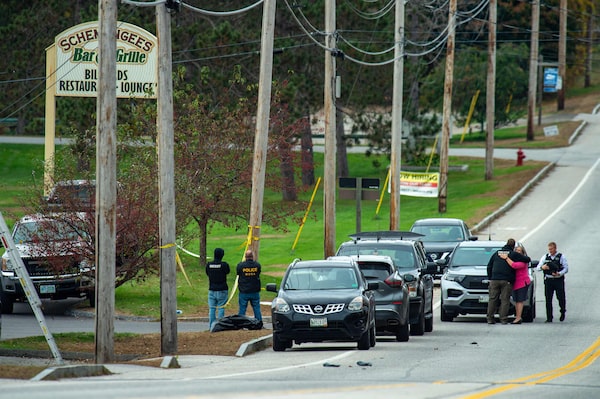
A law enforcement official embraces another person outside Schemengees Bar on Oct. 26, where a mass shooting occurred in Lewiston, Me. A massive manhunt was under way for the gunman who a local official said killed at least 22 people and wounded dozens more.JOSEPH PREZIOSO/AFP/Getty Images
The stain on the American character just got bigger.
Its size was already substantial. This is a country where 567 mass shootings (more than 13 a week), and where 35,401 people have died because of gun violence since January, 2023 (almost the entire population of Prince Albert, Sask.).
This week that stain’s deadly tentacles reached Lewiston, Me., for generations a magnet for immigrants, the home of a sylvan college planted amid old textile mills, a religion-oriented community that is the site of Maine’s only basilica, a small city where the guns in residents’ homes are for hunting.
So expansive is the stain that it touches every corner of American life. For one prominent political figure, it moved this week literally close to home.
Former Republican senator Olympia Snowe lived just down the street from the current site of the Schemengees Bar and Grille, one of the scenes of the shooting. She taught Sunday school in the church that, in her youth, was located there. Her grandparents, uncle and aunt lived on Lincoln Street, where they and other Greek immigrants began their climb into mainstream American life.
“The centre of this horror was the centre of my early life,” Ms. Snowe, who supports background checks for gun purchases, said in an interview. “Lewiston is very much a part of who I am, and I am deeply saddened and heartbroken.”
With at least 18 dead and 13 wounded in a brutal two-venue shooting, Lewiston joins the roll call of sites of American mass shootings: Las Vegas, 2017 (60 dead). Orlando, 2016 (49 dead). Virginia Tech, 2007 (32). Sandy Hook Elementary School, 2012 (27). The Lewiston shooting happened just days before the fifth anniversary of the mass shooting at Pittsburgh’s Tree of Life synagogue, where 11 were gunned down during Sabbath prayers.
“Coming within 48 hours of the commemoration, it pains me once again to know that another community has been devastated by a mass shooting,” said Rabbi Jeffrey Myers, who was presiding over services when the shots rang out in 2018. “I know the pain too well.”
“But,” he continued, “I still wonder: How do you answer what is happening in America? No other country in the world has this problem. We ordinary citizens are left again to pick up the pieces of our lives.”
And so now Lewiston and the surrounding area must deal with its own mass shooting. Schools were closed Thursday. Businesses, too. The 1,792 students of the local Bates College were on lockdown.
Mass shooting in Maine: What we know so far about the attack, the suspect and the manhunt
Canada Border Services Agency alerts guards to look out for wanted Maine gunman
The screech of police and ambulance sirens – initially part of the response to the shootings, then the prelude to the manhunt for the suspect, Robert Card – contrasted with stunned silence throughout the city.
“I’m speechless,” Raymond Clothier, the associate multi-faith chaplain at Bates College, said while sheltering in place at home. “We all have a jumbled mix of emotions. Our students were already exhausted by the Middle East events of October 7th. To try to incorporate this into their psyches is more than we can expect, and more than they can do.”
Guns long have been part of the culture of Maine, where hunting for moose, black bear, rabbit and turkey is popular sport, and where more than half the state’s 91,646 square kilometres of land is open for hunting. This is the hunting season for deer, bear, wild turkey, ruffed grouse, pheasant and raccoon; coyote hunting is permitted year round. That is why Maine political figures, including Republican Senator Susan Collins and Ms. Snowe, generally have expressed support for the Second Amendment, which asserts that the “right of the people to keep and bear Arms, shall not be infringed.”
Maine Senator Angus King, who is an independent, supports limits on magazine size, and making it a crime to send guns across state lines to those who otherwise could not purchase the weapons at home. But he has resisted a ban on assault weapons, arguing that their capacity is little different from that of common semi-automatic hunting rifles.
Like many American political figures, Mr. King believes a more robust effort to battle mental illness is one potential weapon against gun violence. Multiple reports after the shooting suggested Mr. Card suffered from mental illness.
“What strikes every community when this happens is that people say they couldn’t believe it could ever happen there,” former Maine Republican governor John McKernan Jr. said. “It is the last thing that any of us in Maine would have expected.”
But in some ways Lewiston is a microcosm of America. Ms. Snowe’s Greek ancestors were part of a parade of migrants that included Irish exiles, who found work in the mills, and French Canadians, who occupied a part of the city known as Little Canada and struggled to assimilate after a 1919 Maine law made it illegal to speak French in public schools.
The latest arrivals are 6,000 Somalians, who comprise about a sixth of the city’s population and contribute, along with immigrants from Congo, Djibouti, Sudan and Chad, to Lewiston’s status as one of the most heavily Muslim communities in the United States.
“Before the arrival of its asylum-seekers and refugees, Lewiston was one more postindustrial city in slow fade,” Cynthia Anderson wrote in Home Now: How 6000 Refugees Transformed an American Town. “Now its newcomers are part of who it is – so too their life stories and their steady forward motion.”
A small part of the life of the area is the annual pre-Halloween stream of Bates College students to Wallingford’s Orchard in nearby Auburn, Me., for pick-your-own pumpkins, cider donuts and apple dumplings. That very small ritual, and so many bigger things, have been disrupted and marred by the American stain, transformed once again this week into a bloody American tragedy.
Editor’s note: A previous version of this article included incorrect statistics about the number of mass shootings and deaths from gun violence in the United States. This version has been updated.
 David Shribman
David Shribman